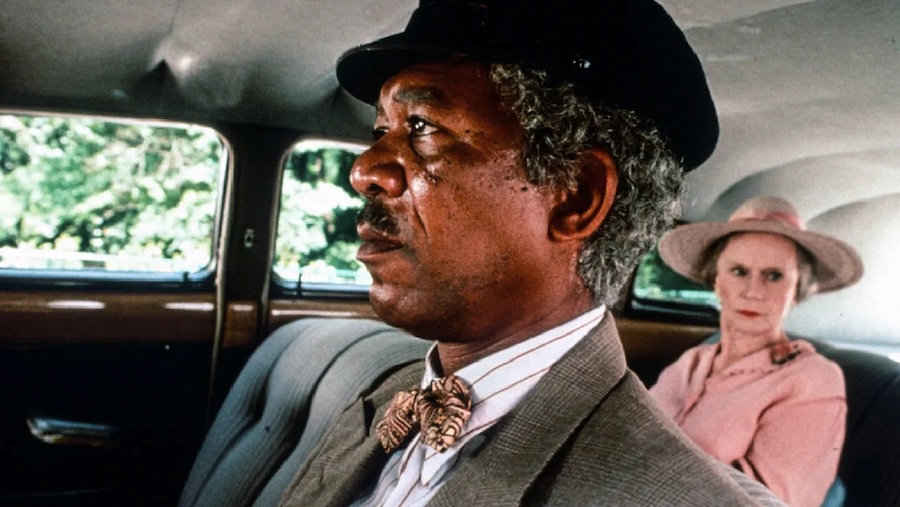

When people list the movies they feel did not deserve to win a Best Picture Oscar, this one often comes up. I agree. The other nominees of that year included My Left Foot, Field of Dreams, Born on the Fourth of July and Dead Poets Society. Each one of them achieved something greater than Driving Miss Daisy.
Still, watching Bruce Beresford’s film is delightful, even thought-provoking at times, and it deserves to be seen without the burden of having won that damned award.
Forced to accept a driver
In 1948, Daisy Werthan (Jessica Tandy), a wealthy widow and retired teacher, has a driving mishap and her son Boolie (Dan Aykroyd) tells her that he will pay for a driver since no insurance company will cover her. A very annoyed Daisy has to accept Hoke Colburn (Morgan Freeman) in her household, even though she initially does her best to make him understand that she doesn’t need him. Hoke, on the other hand, has been instructed by Boolie that she is not his boss and can’t fire him. Daisy is a proud woman who doesn’t want people to know that she’s rich enough to hire a driver, or that she’s now become unable to drive herself… but after a while Hoke is tolerated, even appreciated, as Daisy becomes more dependent on him.
Brought to life with verve
Playwright Alfred Uhry grew up in Georgia where the story takes place. He based it on personal experiences, having been raised in a Jewish family like the Werthans, and incorporated the civil rights struggles of the era. We follow Daisy and Hoke from 1948 to 1973, throughout a church bombing (which was based on a real-life bombing of a temple in Atlanta in 1958), an uncomfortable encounter with racist police officers during an excursion to Alabama, and the rise of Martin Luther King, Jr.. Each event, and others, pose challenges to their relationship as Daisy becomes more aware of the racism that faces Hoke. At the same time, she’s unwilling to fully acknowledge how much she has in common with him (after all, the temple bombing was orchestrated by white supremacists who wanted to get rid of both Blacks and Jews), and Daisy also finds it hard to openly treat Hoke as the trusted friend he inevitably becomes.
The friendship between these two very different characters is brought to life with verve by theater veteran Jessica Tandy, and Morgan Freeman.
At the premiere of the film, there were critics who objected to the portrayal of this relationship and accused Beresford and his collaborators of downplaying the racism. I understand what they’re getting at; there are times when the sweetness of the story tends to overshadow the blood and sweat behind the civil rights struggle. But I also have to agree with James Earl Jones who played Hoke in the play years later and told the New York Times that Uhry chose to write a simple story that leaches out racism rather than one that rigidly repeats arguments that we all know and agree with; he found that far more interesting, and he has a point. The friendship between these two very different characters is brought to life with verve by theater veteran Tandy, and Freeman whose film career at this point was modest.
Hans Zimmer didn’t get a nomination for his music score, but it has nevertheless become a minor classic and certainly helped his fledgling career. Interestingly, he performed the whole score on samplers and synthesizers, which is painfully obvious sometimes. But as a whole, it’s a surprisingly engaging and lively experience.
Driving Miss Daisy 1989-U.S. 99 min. Color. Directed by Bruce Beresford. Screenplay, Play: Alfred Uhry. Music: Hans Zimmer. Makeup: Manlio Rocchetti, Lynn Barber, Kevin Haney. Cast: Morgan Freeman (Hoke Colburn), Jessica Tandy (Daisy Werthan), Dan Aykroyd (Boolie Werthan), Patti LuPone, Esther Rolle.
Oscars: Best Picture, Actress (Tandy), Adapted Screenplay, Makeup. BAFTA: Best Actress (Tandy). Golden Globes: Best Motion Picture (Comedy/Musical), Actor (Freeman), Actress (Tandy). Berlin: Best Acting Team (Tandy, Freeman).
Last word: “Driving Miss Daisy was very hard to actually get into production because the studio executives who looked at it just thought it was very uncommercial. Everyone was understandably enough I suppose, somewhat wary about a film which was essentially an old, black man and an old Jewish lady chatting in a kitchen. You could see them reading the script and thinking, who’s gonna watch this? So, it took us the best part of three years to put it all together.” (Beresford, ABC)
